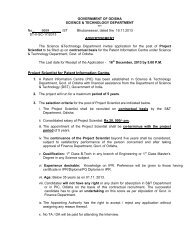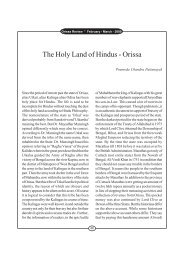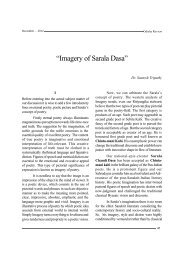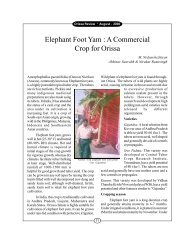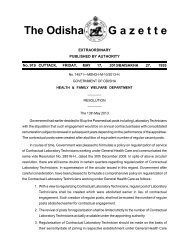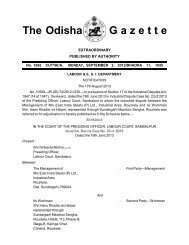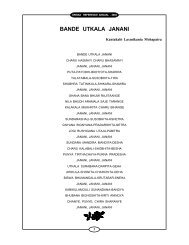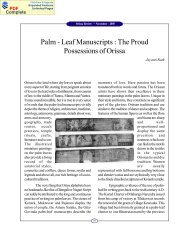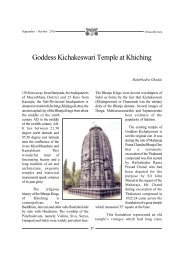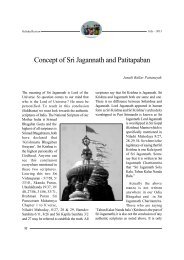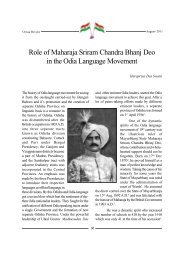The Ritual System - Odisha.gov.in
The Ritual System - Odisha.gov.in
The Ritual System - Odisha.gov.in
You also want an ePaper? Increase the reach of your titles
YUMPU automatically turns print PDFs into web optimized ePapers that Google loves.
July - 2013<br />
curd etc. over the mirrors placed <strong>in</strong> front of the<br />
deities. After abakasa the deities are adorned<br />
with silken cloths, flowers and ornaments, after<br />
which Sahana Mela or Sarva Sadharana<br />
Darshan (free entry of pilgrims to the <strong>in</strong>ner<br />
sanctuary) takes place. It provides an opportunity<br />
to devotees and pilgrims to go near the Ratna<br />
S<strong>in</strong>ghasana to have a closer view of the deities<br />
and circumbulation (pradakh<strong>in</strong>a) of the<br />
Ratnas<strong>in</strong>ghasana. If dur<strong>in</strong>g this time any person<br />
touches the holy bodies, spits, passes stool or<br />
ur<strong>in</strong>e or vomits, then the deities are given a<br />
purificatory bath called Mahasnana. <strong>The</strong>re is<br />
provision for penalty on the person for do<strong>in</strong>g so.<br />
Usually children of tender age are not allowed to<br />
go <strong>in</strong>side. From 8 a.m. to 8.30 a.m. the deities<br />
are dressed <strong>in</strong> different coloured dresses<br />
prescribed for different seasons and occasions.<br />
Simultaneously <strong>in</strong> the meantime roso<br />
homo or putt<strong>in</strong>g sacred fire <strong>in</strong> the kitchen, Surya<br />
Puja (Worship of the Sun God) and Dwarapala<br />
Puja (worship of the door guard<strong>in</strong>g deities – Jaya<br />
and Vijaya) are held. <strong>The</strong>n the breakfast is offered<br />
to the Lords called Gopal Ballava Bhoga. It<br />
consists of sweets, fruits, curd, butter, green<br />
coconut, sweetened coconut balls (laddu),<br />
planta<strong>in</strong>s, Khua Manda (cream ball) and Ballava<br />
Khai (twice fried rice mixed with ghee and sugar)<br />
etc.<br />
<strong>The</strong> next cooked food offer<strong>in</strong>g to the<br />
Lords is known as Sakala Dhupa or Raja<br />
Bhoga. Besides the rice of different varieties, the<br />
cakes of black gram (biri) and other prescribed<br />
items are served <strong>in</strong> limited quantities and number.<br />
<strong>The</strong>n the deities change their dresses, decorated<br />
and take the next food offer<strong>in</strong>g called Bhoga<br />
Mandapa <strong>in</strong> the refractory hall beh<strong>in</strong>d Garuda<br />
stambha. This Bhoga or food offer<strong>in</strong>g has been<br />
<strong>in</strong>troduced to cater Mahaprasad to the pilgrims,<br />
various Matha and other <strong>in</strong>stitutions, private<br />
<strong>in</strong>dividuals <strong>in</strong> huge quantities. This is ma<strong>in</strong>ly meant<br />
for sale.<br />
<strong>Odisha</strong> Review<br />
Madhyanha Dhupa or pr<strong>in</strong>cipal mid day<br />
Bhoga is offered at 1 p.m. <strong>in</strong> which different types<br />
of rice, pulses, vegetables and variety of cakes<br />
are offered. District Gazetteer (Pp.809) records<br />
that 435 food items were offered <strong>in</strong> this dhupa <strong>in</strong><br />
1910. It consists of rice of various k<strong>in</strong>ds, pulses<br />
and vegetables with varieties of cakes and sweets.<br />
<strong>The</strong>n the deities retire for a mid-day siesta (diba<br />
pahuda) after be<strong>in</strong>g offered green coconut,<br />
perfumed water and beetle nut. <strong>The</strong>y get up at 6<br />
p.m. when Sandhya Alati or even<strong>in</strong>g offer<strong>in</strong>g of<br />
sacred lamp <strong>in</strong> camphor, ghee wigs and pasted<br />
rice is done. <strong>The</strong> devotees and pilgrims eagerly<br />
stand await<strong>in</strong>g to see this ritual.<br />
At 8 p.m. Sandhya Dhupa or night food<br />
offer<strong>in</strong>g is served which consists of ghee rice<br />
(gheeanna) and fragrant sweetened soaked rice<br />
(subasa pakhala), sweets, cakes of black gram,<br />
etc. <strong>The</strong>n at 9.15 p.m. the Gods appear for public<br />
Darshan. <strong>The</strong> Gods then change dresses after<br />
be<strong>in</strong>g smeared with fragrant sandal paste mixed<br />
with Karpura (camphor), Keshar and Kasturi<br />
<strong>in</strong> silver pots called Chandan Lagi. At 10.30<br />
p.m. the deities aga<strong>in</strong> change their dresses and<br />
wear Baralagi Pata (the silken cloth with<br />
prescribed colour of the day). <strong>The</strong> Lords are then<br />
decorated with flower decoratives called<br />
Chandrika on head, Nakachana on nose,<br />
Karapallava on hands and padaka on the chest<br />
along with lots of other flower garlands. Some<br />
selected stanzas of Gita Gov<strong>in</strong>da, composed by<br />
Odia poet Jayadev are woven on the body of the<br />
saree called Gita Gov<strong>in</strong>da khandua, which the<br />
Lords put on dur<strong>in</strong>g this ritual. After that Bada<br />
S<strong>in</strong>ghara Dhupa or last food offer<strong>in</strong>g takes<br />
place. A particular cake prepared by green banana<br />
called Kadali Bada, pitha of black gram, khiri<br />
(milk made sweetened item), kanji (a curd<br />
preparation), soaked rice, etc are offered <strong>in</strong> this<br />
Dhupa. <strong>The</strong> last rite is at 12 p.m. when the musical<br />
<strong>in</strong>struments like veena and drum are played with<br />
Gita Gov<strong>in</strong>da music, dance by Mahari or<br />
29



